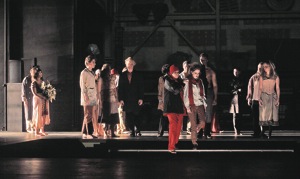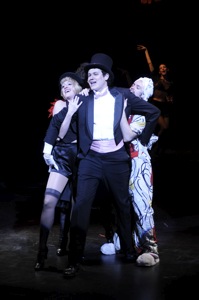-
- George Mason University picks man as homecoming queen
- Comments about gays cost lawmaker committee position
- Sean Penn wins best-actor Oscar for ‘Milk’
- Calif. lawmakers back Prop. 8 challenge
- Anti-marriage spot called ‘sniper ad’
- Bias ruled out in NY GLBT youth center vandalism
- Group fights anti-gay adoption bill
- National News Briefs
- World News Briefs
Theater
The sweet sound of musicals, politics and fate
Published Thursday, 26-Feb-2009 in issue 1105
‘The Sugar Syndrome’
A play about a child molester, a bulimarexic, a lonely 20-something and a deserted housewife sounds like a heavy slog for an evening’s entertainment.
But playwright Lucy Prebble’s The Sugar Syndrome tells the story of these misfits with a facility for comic dialogue that at once makes the predictable medicine go down more easily and leaves the viewer with the vaguely guilty feeling that laughter may not be the appropriate response.
MOXIE Theatre presents The Sugar Syndrome through Sunday, March 8, at Diversionary Theatre. Jennifer Eve Thorn directs.
Somewhere in England, 17-year-old recovering anorexic Dani (Rachael Van Wormer) enters an Internet chat room, where she meets geeky 20-something Lewis (Jesse Allen Moore), who is entranced by her come-hither chat. In this case, however, the uninhibited Dani goes to him, with the expected results.
Soon after that, Dani bumps into 38-year-old pedophile Tim (Sean Cox) online and fails to disabuse him of his assumption that she is an 11-year-old boy. Their meeting in a park is disappointing on both sides, but the naively adventurous Dani finds him “nice” and, sensing a kindred wounded soul, decides to try to help him overcome his addiction.
Meanwhile at home, Dani’s mum Jan (Terri Park) finally owns up to the fact that her husband is both adulterer and deserter and tries unsuccessfully (but comically) to establish more than the usual minimal parental contact with her adolescent daughter.
As the black comedy plays out on Amy Chini’s effective high-tech-look black set, Prebble allows Dani no behavioral judgment of others; her comment that “We don’t judge anything anyone does, only how it’s reported” is oddly reminiscent of Henry Higgins’ comment, “The French don’t care what you do, actually, as long as you pronounce it properly.”
Every cast member is spot-on: Van Wormer does her usual excellent job as the bright if reckless Dani; Moore convinces as the geeky Lewis; Park will break your heart while tickling your funnybone as Jan; and Cox is chillingly ordinary, even charming as the wannabe recovering pedophile.
The play’s title refers to rationing tokens that were used during the war for hard-to-get items like meat and sweets. Jan notes that many people, fearful they might not survive another day, used their tokens for the instant gratification afforded by sweets.
Prebble is quite the theatrical wonder in England. Largely on the strength of this play, the 26-year-old playwright was hired to write an eight-episode British TV show based on the diaries of high-end London call girl Belle de Jour. I hope to see more of her plays on this side of the pond.
MOXIE Theatre’s production of The Sugar Syndrome plays through March 8, 2009 at Diversionary Theatre. Shows run Thursday through Saturday at 8 p.m.; Sunday matinée at 2 p.m. For tickets, call 858-598-7620 or visit www.moxietheatre.com.
‘Musical of Musicals (the musical!)’
If you are, like me, a little nostalgic for the satirical Forbidden Broadway shows we had here for a few years, have I got a show for you.
San Diego State University theater students present the 2005 off-Broadway hit Musical of Musicals (the musical!) through Sunday, March 1, at SDSU’s Experimental Theatre.
Director Rick Simas opens the show as a professor about to lecture on the history of musical theater, when a few of his students suggest they just present a show that will demonstrate the prof’s points.
They pick a simple plot: Somebody can’t pay the rent. The question: How would five well-known musical comedy composers or composing teams handle that topic? The conceit: The show will use the composers’ own songs as points of departure.
The composers are Rodgers and Hammerstein, Stephen Sondheim, Andrew Lloyd Webber, Jerry Herman and the team of John Kander and Fred Ebb. Consistent characters are June, who can’t pay the rent, Jitter the landlord and Abby, the older woman to whom June goes for advice.
In A Little Complex (the Sondheim parody), it’s “welcome to the woods,” where “everyone here has at least one screw loose.” Landlord Jitter (Billy Thompson), a Sweeney Todd look-alike, wants Jeune (who can’t pay the rent) to pose for him, allowing that “the art of retribution/depends on execution. He considers poison, but decides that “hemlock is easy/but too Socrates-y.”
Aspects of Junita finds Sir Phantom Jitter (Joe Joyce) offering to forgive the rent if Junita “will sing something I write myself.” But Junita (Katie Alexander) is firm: “I will never sing for the middle class. Screw the middle class.” This Webber parody also has a wonderful bit by Amy Fritsche, playing the aging Abigail von Schtarr: “Who cares if you’re over the hill/as long as you’re over the top?”
Fraulein Abby (Gracie Lee Brown) has a terrific bit in Speakeasy, the Kander & Ebb parody (they wrote Chicago and Cabaret), in which she advises the impecunious Juny (Katie Alexander) to “sell your body” in order to pay the rent. After all, she says, “You sell it, you still got it.”
Musical of Musicals (the musical!) is a hoot and a half. It’s a lot funnier if you know the musicals being parodied, but these students are immensely talented and obviously having such a wonderful time that you’ll come out smiling too.
But hurry; the show closes Sunday.
Musical of Musicals (the musical!) plays through Sunday, March 1, at SDSU’s Experimental Theatre. Shows run Thursday through Saturday at 8 p.m.; matinée Sunday at 2 p.m. For tickets, call 619-594-6884 or visit http://theatre.sdsu.edu.
‘Danton’s Death’
Lord Acton’s comment about the corrupting influence of absolute power could have been describing Robespierre, the architect of the post-French Revolutionary Reign of Terror, which in the interest of wiping out “vice” (defined as “royalists, foreigners and liberals”) resulted in wholesale executions of anyone deemed not sufficiently pure.
Dominique Serrand directs UCSD theater students in Danton’s Death, Georg Büchner’s meditation on political rigidity and the inexorable wheel of fate, through Saturday, Feb. 28, at the Mandell Weiss Theatre.
Danton’s Death is a talky play that begins in 1793, four years into the revolution, with the exhausted Georges Danton (Bowman Wright) feeling the weight of royalist executions on his conscience and refusing to participate in any more murders.
The play lacks traditional structure; it begins in the middle, with Danton realizing that the revolutionary ideals for which he struggled were already being corrupted by “the incorruptible” Robespierre (Ross Crain). In a series of loosely connected scenes, Danton will rail against the fanatical new government until the Reign of Terror sees fit to send him to the guillotine as well.
This is a difficult play for American audiences, most of whom will likely have forgotten whatever they may have learned about the French Revolution and be unclear about the characters. Serrand does not make it easier either in the program (characters are named but not identified) or with gender-blind casting: Danton’s friend Camille Desmoulins is played by Jessica Watkins; love scenes between Camille and his wife Lucille (Maren Bush) force the viewer out of the play and into a meditation about why this casting. Likewise, Robespierre’s right-hand man Saint-Just is played by Marshel Adams.
Nor does the set help. Stage right is a shiny, contemporary-look, metallic wall with a door. Stage left, Serrand’s signature: a tangle of chairs, some hanging, some upended, some just there on the floor. The backstage area is used as a prison cell when the rear fly is raised.
The stage has a limited play space because of a huge rectangular trap in the middle with stairs leading to the (unseen) guillotine. This requires scenes to be played in thin spaces around the perimeter. Some of the characters (Lucille, for one) seem to spend the evening running around the set. Others speak from so far upstage that it is doubtful their lines can be heard in the back of the theater. (I had trouble in the fourth row).
Kudos for the choice of music, though: strains of Brahms’ fitting A German Requiem are heard throughout.
The actors do what they can with this difficult assignment. My favorite is Crain’s Robespierre: regal, sure of himself, ideologically rigid, he casts a frightening (and all too familiar) shadow. Wright’s Danton is less successful, partly because he is too often asked to speak from far upstage and partly because he needs better diction in general.
Serrand’s addition of the nonspeaking Liberty (Bianca Harlow), an elegant young woman clad in a floor-length gown in the colors of the French flag, adds visual interest even without a raison d’être.
Büchner, a German theatrical wunderkind who died of typhoid at 23, is credited as the forerunner of naturalism, expressionism, existentialism and the theater of the absurd. He is not well served by this production.
Danton’s Death plays through Saturday, Feb. 28, at the Mandell Weiss Theatre. Shows Thursday through Saturday at 8 p.m.; matinée Saturday at 2 p.m. For tickets, call 858-534-4574 or visit http://theatre.ucsd.edu/season.
|
|
Copyright © 2003-2025 Uptown Publications




